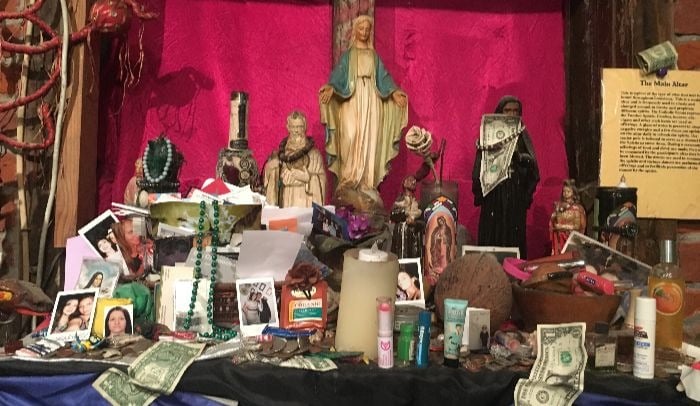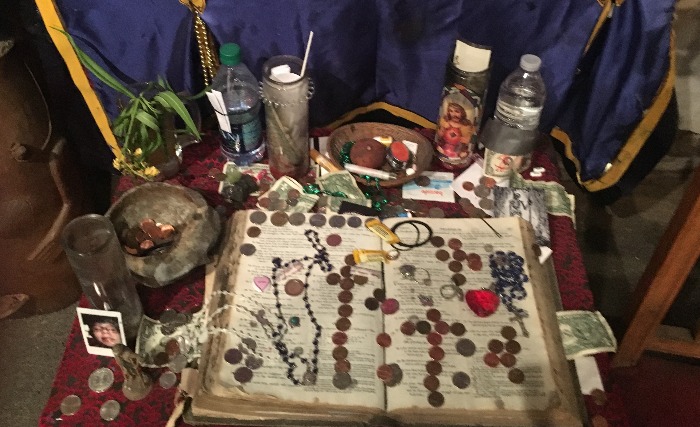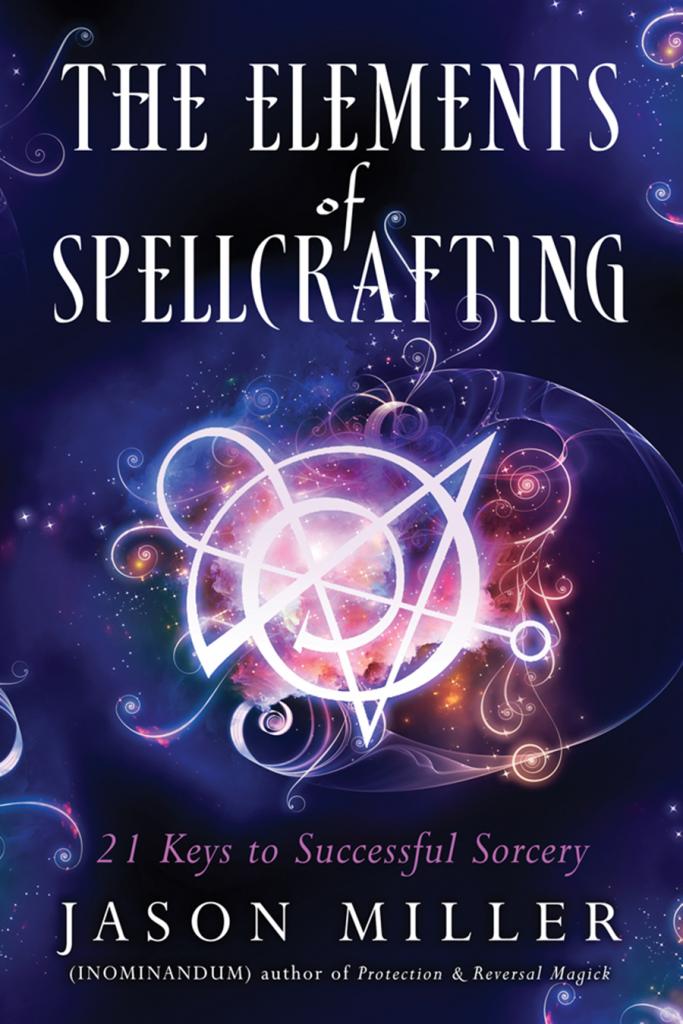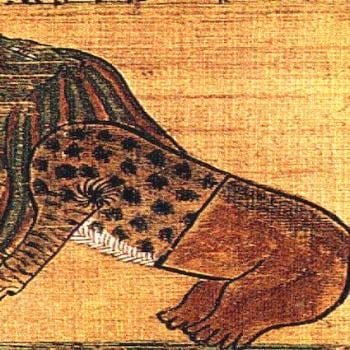Adapted and reprinted with permission from New Page Books, an imprint of Red Wheel/Weiser. The Elements of Spellcrafting by Jason Miller is available wherever books and ebooks are sold or directly from the publisher at Red Wheel/Weiser or by calling 800-423-7087.
If you asked my students what the single greatest game-changer for improving their Magic that they got from my teachings, most of them would say “offerings.” A lot of you reading this might already be well acquainted with offerings to spirits; some of you are surely initiated into Vodou, Candomble, or another African traditional religion where offerings play a huge role.

That is where I first encountered them myself. The first offering I ever did was to Papa Legba shortly after moving to Philadelphia, in hopes that he would help me gather a group of Magicians to work with. The morning after one of the biggest snowstorms that decade, I went out to the corner of 6th and Pine, the corner where my apartment was located, and drew a very large veve of Legba that extended one-fourth of the way up each street on that block. I made an offering of a coconut filled with palm oil, and a candle, and asked for his help.
I want to be clear here: This is not how proper Vodou is done. This was a much younger me, and what I knew of Vodou came from Milo Rigaud’s book, some correspondence with Max Beauvoir, and Louis Martine’s Tarot. Thankfully the Lwa sometimes smile on fools, and later that week, a friend contacted me and asked if I was interested in starting a Philadelphia OTO group. One month after that offering, the first meeting happened at my apartment. That group pulled me into contact with some of the best people I have ever worked with. Though I am no longer a member of the OTO, I still occasionally get asked to teach there, and am very proud that Thelesis Oasis, a small group that started in my living room, still exists 20 years later.

Gumball Magic
This type of Magic—making an offering to a specific spirit for a specific service, is common throughout the world. It is what my friend Persephone calls “gumball Magic”: Put a quarter in the machine, get a gumball out— that simple. If you know what a spirit likes, or what is traditionally offered, then you can make an offering and ask for a boon in return.
The offerings not only honor and in some cases feed the spirit, but act as a foothold into the physical world and are yet another way of bridging that divide between the spiritual and the material.
Sometimes the offering is part of the spell itself, and you do something like feed a spirit hot foods or herbs to “heat it up” and get it to act quickly. Other offerings can cool it down, helpful when cooler heads need to prevail.
Whatever spirit you are working with, the offerings will require some research on your part. Both as individuals and as classes of spirits, there are different things that are appreciated, and others that are taboo. Tobacco may be appreciated by most of the spirits from the Diasporic religions of the Caribbean, but are repugnant to some Dharmapalas of Tibet, who legend says helped Padmasambhava remove the plant from the country in the 8th century. Burnt meat was appreciated by Jehovah as well as wrathful spirits the world over, but the Nagas are so repelled by the eating of animals that some of their Puja ceremonies require the person making the offering to abstain from meat and even eggs for hours prior.
If you want to make an offering to a specific spirit, start with the living tradition if one exists. Then go to the folklore and history for examples of what may be appropriate. Sometimes you will find offerings that you can make easily enough such as eggs, dandelions, and honey to Hekate. Other times you will come across offerings that are unmanageable or ethically questionable, such as 100 oxen to Hekate, which, while traditional, is hard to pull off in the backyard. After your research, you can use divination to fill in gaps and confirm your ideas. The final test will be whether the deity takes your offering and fulfills your request.
Of course, there are other deeper approaches than the tit-for-tat gumball Magic where you make an offering in exchange for a service. A regular practice of offerings will help you build real relationships.

Regular Offerings
If you make offerings a part of your regular practice, then you will develop more powerful and long-term associations with the spirits than you can with simple contracts. One of my Haitian teachers stressed this as a difference between the Bokor (Sorcerer for hire) and Houngan or Mambo (Priest or Priestess of Vodou) in Haiti. When I began to study Tibetan Magic, offerings were again emphasized in an even more advanced and profound mode. In this case, offerings were not only done to spirits that we were working with through the tradition, but were made on a regular basis to large classes of beings that inhabit the whole world. This helped up my Sorcery success rate dramatically.
Think of it this way: If you asked a stranger to loan you 50 dollars, they would probably say no. If you asked someone you worked with for 50 bucks, they may lend it or they may not, depending upon your experience with that person. If you asked your best friend for 50 dollars, it’s almost certain that they would lend it if they had it and ask if you needed anything else. They would also probably not be concerned about the date of payback because you have a long history, likely making gestures of goodwill to one another for many years. These gestures of goodwill are offerings, and making them regularly will put the whole universe just a bit more in your corner when you need something.
I follow a pattern of offerings inspired by Tibetan Magic during which I burn incense (which flows upward) and pour water, tea, or whiskey to the ground each morning (flowing downward), all the while acknowledging four classes of recipients.
The first and highest classification of guest are the deities as well as those beings that can be considered enlightened such as Buddhas, ascended masters, and if you like, the universe itself. This type of guest doesn’t in any way need the offerings that we make; the benefit is strictly ours.
By making offerings to such beings, we remind ourselves what we constantly strive toward, and in turn build a connection to beings that have achieved that level of realization. It is an exchange of energy like that between a parent and child. Your child may give you something that you neither want nor need, but you not only accept it, but go out of your way to enjoy it fully, because you know that it cultivates certain qualities in the child. In a similar way, we can say that the Gods do not need our offerings, but that doesn’t mean we don’t need to make them.
The second classification of guest are the protectors, guardians, Saints, and lesser deities of a tradition. These are beings of great power but who are not fully realized beings. They do enjoy the substance of the offering that is made, but do not depend upon them.
The third classification is simply all regular beings. This can include all nonphysical entities such as nature spirits and ghosts, as well as the spirits of all currently incarnated beings. In short, everyone, but most especially those beings in your local area—the woods near your house, the lake or ocean nearby, the trees in your yard, the winds that blow through. The spirits on the land and all that is upon it.
The fourth classification singles out beings to whom you owe debt. This debt could be problems that come from this life or a previous life. It may have to do with specific ways that you have dealt with Magic or just how you live your life. The most common example is a spirit of nature that you have run afoul of through your ordinary human actions, like driving through a certain area or dumping trash. A good portion of the traditional shaman’s work was keeping the balance between our world and the world of the spirits, a role that the Sorcerer will sometimes be asked to fulfill. Being a Magician, you are even more able to trample upon the turf of spirits or powers that you may not even be aware of. Making offerings to this class of beings can act as a type of uncrossing that can, by itself, make life start to run more smoothly.
ABOUT THE AUTHOR
Jason Miller (Inominandum) has devoted 25 years to studying practical magic in its many forms. He is the author of the now classic Protection and Reversal Magick as well as The Sorcerer’s Secrets, Sex Sorcery and Spirit, and Financial Sorcery. He also runs the Strategic Sorcery Training Course, Take Back Your Mind Program, and The Sorcery of Hekate Training. He lives with his wife and children in the New Jersey Pine Barrens. Find out more at his website.


















